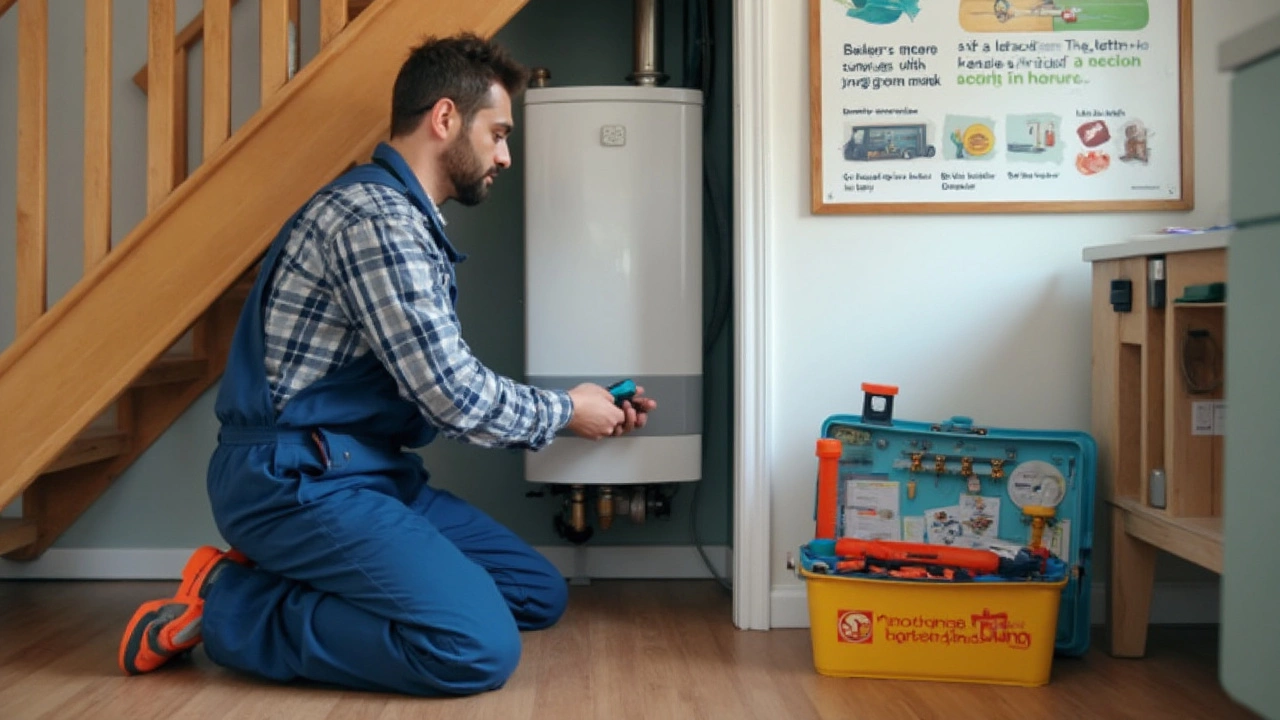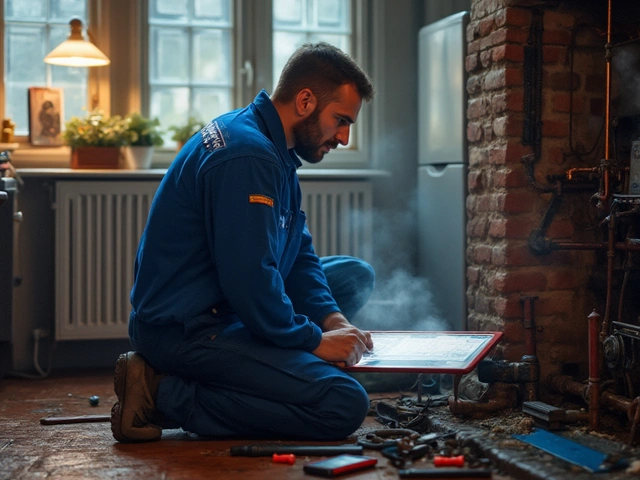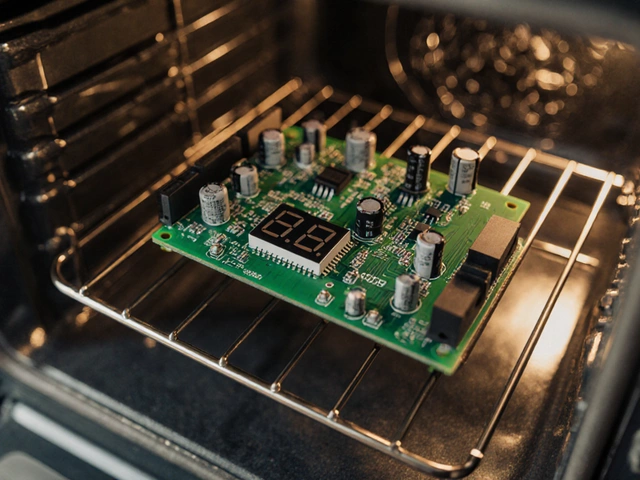Gas appliances have been a household standard for decades—think gas stoves that fire up instantly or water heaters that never seem to quit. But lately, it feels like everyone’s asking: Should I keep them, repair them, or send them packing for something electric?
If you’re on the fence, trust me, you’re not alone. Energy bills aren’t getting any kinder, and news stories keep popping up about health and safety risks. But before you start ripping out your gas lines, it’s worth weighing the nuts and bolts—like how much repairs usually run, what new local rules mean for your home, and even the surprising stuff nobody talks about (cooking with gas can spike indoor air pollution—yeah, even if you can’t see or smell it).
The trick isn’t just guessing what’s best, but knowing the trade-offs. Is that 15-year-old gas furnace worth another repair, or is it time for a clean break? Sometimes the answer isn’t obvious. Let’s lay out the facts, share some candid tips, and help you figure out the next move that actually works for your home and your wallet.
- Gas Appliances: What’s the Real Issue?
- Safety and Environmental Concerns
- Repair or Replace: What Makes Sense?
- Cost, Convenience, and Home Value
- Tips Before You Decide
Gas Appliances: What’s the Real Issue?
So what’s behind the sudden debate about gas appliances? It’s not just hype. For years, people loved the reliability and speed of gas stoves, water heaters, and clothes dryers. But times are changing, and real concerns are popping up.
First, a lot of homes still run on gas appliances, especially older ones. Around 40% of U.S. houses use natural gas for heat or cooking. But these appliances aren’t always as clean as we thought. Studies from places like Stanford have found that gas stoves leak small amounts of methane, even when turned off. That’s a problem because methane is a powerful greenhouse gas—way stronger than carbon dioxide in the short term.
Then there’s safety. Gas leaks and carbon monoxide build-up aren’t just ‘what-ifs’—every year, fire departments respond to thousands of calls about gas leaks. Even small leaks can cause big headaches, including headaches (literally), dizziness, or worse if you don’t have a carbon monoxide detector.
And let’s talk indoor air quality. Using gas for cooking releases nitrogen dioxide, which—surprise!—can make asthma and other breathing problems worse, especially for kids. You can’t always smell or see these fumes, so you might not notice them building up if you don’t have good kitchen ventilation.
There’s a money angle too. Sure, gas has usually been cheaper per unit than electricity, but prices can swing a lot. Plus, older gas appliances can suck energy and spike your monthly bill, especially if they’re not tuned up or vented right.
The issue really boils down to a trade-off: gas gives you speed and power, but it’s not as green or as safe as we once thought. That’s why cities like New York and Berkeley are throwing out new building codes that ban or limit gas in new homes. It’s a big change that’s starting to spread, and it’s got a lot of folks rethinking what’s in their kitchen or basement.
Safety and Environmental Concerns
Gas appliances can make life easier—until they don’t. Safety is usually the first thing people worry about, and for good reason. Gas leaks are no joke. A small crack in a pipe or a loose connector can lead to leaks, and just a little bit of natural gas in the air is enough to cause headaches, dizziness, or even bigger problems if left unchecked. And let’s be real: any appliance that burns fuel indoors is also making carbon monoxide, even if you can’t see or smell it. That’s why local codes often require carbon monoxide detectors, especially if you’ve got a gas furnace or water heater in a closed-off space.
It’s not just about what could go wrong inside your house. There’s a lot of talk these days about how much pollution gas appliances kick out. Even a typical gas stove can boost indoor nitrogen dioxide levels to a point where it’s not so great for kids with asthma or anyone sensitive to air quality. Electric appliances don’t add those same pollutants to your air, so more cities and states are pushing for the switch. In fact, as of 2024, over 100 cities in the U.S. have put some kind of restriction on gas hookups in new buildings.
| Risk/Issue | Gas Appliances | Electric Appliances |
|---|---|---|
| Carbon Monoxide (CO) Emissions | Yes, can build up indoors | No CO produced |
| Nitrogen Dioxide (NO2) Levels | Often above recommended limit | None |
| Explosion/Leak Risk | Possible if lines fail or leak | Extremely rare |
| Greenhouse Gases from Use | Yes, from burning gas | Depends on electricity source |
The bottom line? If you’re strict about maintenance—getting those annual checks, making sure vents are clear, and installing CO alarms—gas appliances are usually safe. But nobody’s perfect, so there’s always some risk. If you’re thinking about making the leap to electric, you’re dodging those air-quality concerns inside your home and making a smaller dent in climate emissions (especially if your local electricity is greener than it used to be).
- Always check for odd smells (that distinct rotten egg odor means trouble—shut the gas off immediately).
- If pilot lights keep going out, get a pro to look before things get dangerous.
- Check for city incentives before swapping appliances. Some pay you back big if you go electric for health reasons.

Repair or Replace: What Makes Sense?
Ever faced a rattling old gas stove or a water heater with a mood swing? You’ve got to decide: is it worth another fix or should it make way for something newer? Before throwing money at repairs or splurging on brand-new stuff, a closer look at costs, lifespan, and real-world hassles pays off—literally.
First thing, check the age of your gas appliance. Gas stoves usually last 15-20 years, while water heaters give you around 10-12 years. Furnaces? About 15-20 years too, if you’re good about maintenance. If your appliance is on its final laps, repairs can stack up fast.
Here’s a cheat sheet with average repair vs. replacement costs:
| Appliance | Common Repair Cost (USD) | Replacement Cost (USD) | Typical Lifespan (Years) |
|---|---|---|---|
| Gas Stove | 100–400 | 600–2,000+ | 15–20 |
| Gas Water Heater | 150–500 | 900–1,800 | 10–12 |
| Gas Furnace | 300–1,200 | 3,000–7,000 | 15–20 |
If repair will set you back more than half the price of a new appliance, most pros say just swap it out—especially if it’s nearing the end of its run anyway. That old water heater coughing up rust or furnace making weird noises? Probably time to move on.
There’s also energy savings to think about. Newer gas appliances run way more efficiently. Swapping out that clunky model from the ‘90s could put a dent in your bills. Plus, keep an eye out for rebates. Cities like San Francisco, New York, and others around the country are handing out incentives for folks who upgrade to efficient or electric models.
But, if your machine’s barely five years old and the repair is minor—like swapping out a faulty igniter or replacing a thermostat—repair wins every time. Sometimes it’s just a $30 part and a 20-minute fix. Just make sure you use a licensed tech, especially for anything dealing with gas lines or carbon monoxide safety.
- Check the appliance’s age and service history.
- Compare repair costs to half the price of a new one.
- Factor in everyday headaches: odd smells, noisy ops, or uneven heat point to bigger problems down the road.
- Ask about rebates before you commit.
- When in doubt, get a pro’s opinion—most give free or cheap estimates.
Bottom line: don’t shell out big money to keep a dying gas appliance alive. But don’t toss a nearly-new one just because of a tiny glitch. A bit of homework now saves you cash and hassle later on.
Cost, Convenience, and Home Value
Let’s get real about what actually hits your wallet and your daily routine when you’re debating whether to keep, repair, or replace gas appliances. There’s more to it than just sticker price. We’re talking regular energy bills, repair headaches, future resale value, and even daily habits like how quick dinner hits the table.
First up, let’s look at money. Gas appliances usually cost less to run compared to electric ones, depending on your location and utility rates. According to the U.S. Energy Information Administration, natural gas typically runs about 30% cheaper than electricity per BTU. But that gap is closing as electricity gets cleaner and, in many places, cheaper with renewables. Here’s a quick breakdown:
| Appliance | Avg. Annual Gas Cost | Avg. Annual Electric Cost |
|---|---|---|
| Gas Furnace | $550 | $900 |
| Gas Water Heater | $290 | $500 |
| Gas Stove | $30 | $60 |
Repairs can sneak up on you. Fixing a gas furnace runs from $150 to $700 on average, while a full replacement can hit $5,000 or more. Electric units sometimes cost more upfront but tend to need fewer repairs due to fewer moving parts. Installation is a big expense too—switching from gas to electric, especially for stoves or dryers, usually means running new wiring, which isn’t cheap.
When you talk about convenience, gas wins points for fast cooking, endless hot water, or reliable heating during blackouts (since many gas furnaces don’t rely fully on electricity). But electric models offer set-it-and-forget-it simplicity—no pilot lights, no open flames, and no waiting for a repair tech specialized in gas systems.
Then there’s home value. This is where stuff gets interesting. In some markets, buyers love gas for gourmet cooking and efficient heat. But in more cities lately, local laws are starting to ban new gas hookups or offer rebates for going electric. Listings that mention “all-electric” are creeping up, especially in places like California. If you’re thinking about selling, it’s worth checking what’s hot (or not) in your zip code.
So, here’s a quick gut check:
- Running costs: gas is still usually cheaper, but not by much these days.
- Repairs: cost more for gas in the long run, but electric upgrades may need electrical work.
- Convenience: gas is quick and reliable, electric is lower-maintenance.
- Home value: check your local trends—what buyers want is changing fast.
Bottom line? The real winner depends on your energy rates, your repair budget, and what makes life easiest for you at home. If you use the gas appliances you already have, keeping them repaired might save you money right now. If you’re renovating or thinking long-term, switching could be worth it—especially if you want to future-proof your house.

Tips Before You Decide
Before you dive into swapping out or repairing any gas appliances, there are some practical steps that can make the decision way easier. You don’t need to be a home repair expert. Just use these as a quick checklist before you spend big on repairs—or invest in new gear.
- Check for Incentives: Some cities and states are offering cash rebates or tax credits if you replace gas stoves or heaters with electric models. Check your local government website or utility company before you commit. Sometimes, you can save hundreds or even thousands just by timing your upgrade.
- Look at the Age: If your gas appliance is pushing 12-15 years, replacement starts to make more sense. Older units not only run less efficiently, but repairs can cost more than they’re worth. Most water heaters, for example, rarely cross the 12-year mark without dropping performance.
- Safety First: Make sure carbon monoxide detectors are installed near any gas-burning appliance. Even a hairline crack in a heat exchanger or a blocked vent can cause big problems. Most fire departments recommend testing these detectors monthly, especially in homes with gas heat or ranges.
- Compare Running Costs: Natural gas used to be dirt cheap, but prices have crept up in a lot of places. Look at your home energy bills. In some spots, running a high-efficiency electric heat pump can be cheaper year-round.
- Ventilation Matters: Gas stoves, no matter how new, can add nitrogen dioxide and tiny particles to your kitchen air. If you cook a lot, use the range hood every time, or crack a window. No hood? You can add small, plug-in air purifiers for a little extra peace of mind.
- Repair Estimates: Before trashing an old appliance, get at least one quote for repairs. Sometimes a basic part swap (like a thermocouple or igniter) solves everything for under $100. Other times, a failing control board means it’s smarter to start fresh.
Bottom line: weigh all the factors—not just one. Take time to call your utility company, ask about current rebates, and get those safety checks done. The best move isn’t always what’s popular; it’s what saves you stress, money, and keeps your home humming safely.





